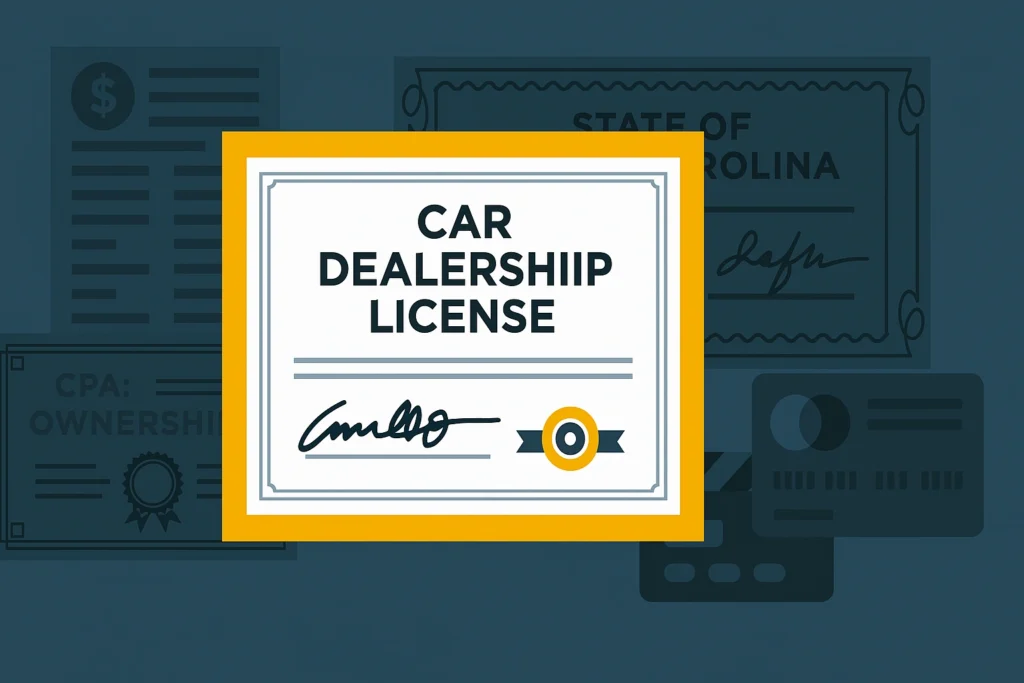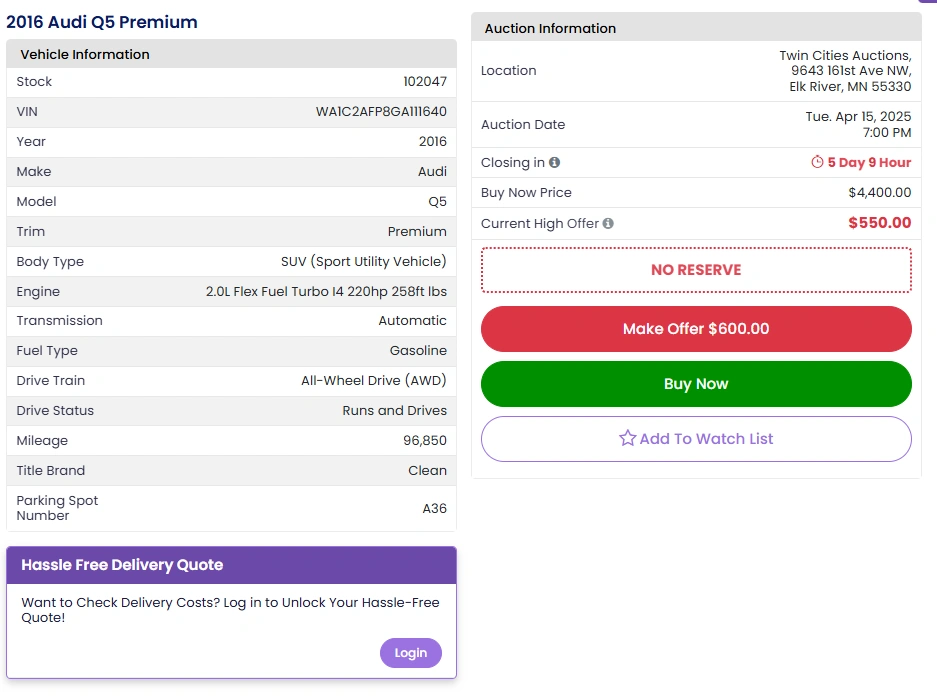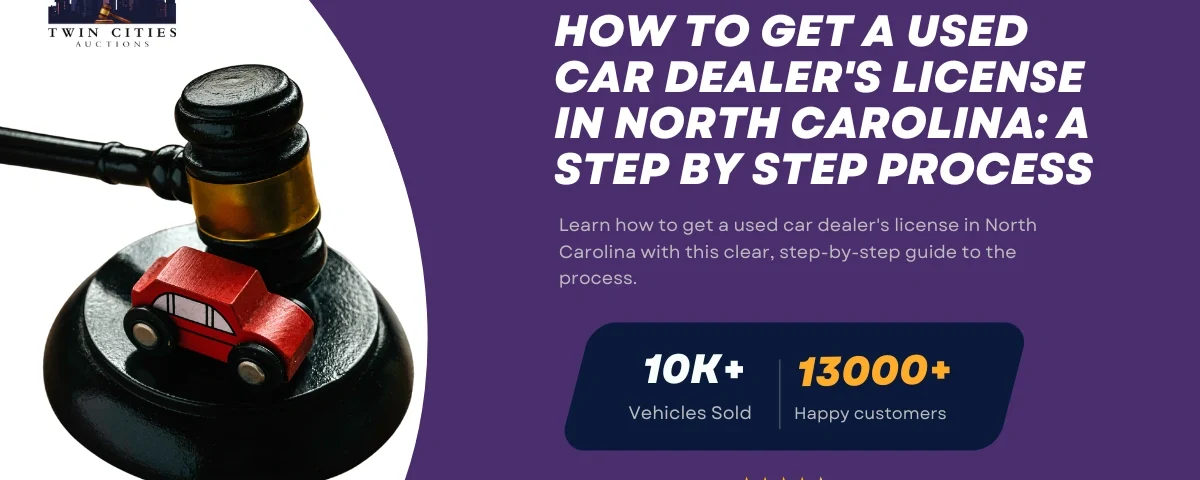Are you considering starting your own used car dealership in North Carolina? Whether you’re looking to sell a few vehicles or run a full-fledged dealership, obtaining a Used Car Dealer’s License is essential for operating legally in the state.
Understanding the process, from application submission to passing inspections, is the first step to success in the auto sales industry.
In this comprehensive guide, we’ll cover the step-by-step process of getting a used car dealer’s license in North Carolina.
We will also explore the importance of selecting the right license and why buying vehicles through Twin Cities Auctions could be the key to filling your inventory with quality cars at competitive prices.

Key Takeaways
- Used Car Dealer’s License is required to sell more than 5 vehicles per year in North Carolina.
- Applicants must meet eligibility criteria such as being at least 18 years old and having a compliant dealership location.
- Pre-licensing education is mandatory for all applicants to learn about North Carolina’s vehicle sales laws and regulations.
- Twin Cities Auctions provide a cost-effective way for dealers to acquire vehicles for resale.
Step by Step Process: How to Get a Used Car Dealer’s License in North Carolina
Step 1: Ensure You Meet the Eligibility Requirements
To start the process, ensure that you meet the basic eligibility criteria for a used car dealer’s license in North Carolina:
- Minimum Age: You must be at least 18 years old.
- Criminal Background Check: You must pass a criminal background check. Felony convictions related to auto sales, fraud, or theft may prevent you from obtaining a license.
- Physical Location: You must have a physical dealership location. A residential address will not be accepted for a dealership.
- Liability Insurance: Proof of liability insurance is required to protect both your business and customers.
Step 2: Choose the Right Type of License
North Carolina offers several types of dealer licenses:
- Retail Dealer License: This license allows you to sell vehicles directly to the public. If you plan to operate a retail dealership, you will need this type of license.
- Wholesale Dealer License: This license is for dealers who buy and sell vehicles only to other licensed dealers. You cannot sell vehicles directly to the public with a wholesale dealer license.
If you plan to engage in both retail and wholesale activities, you will need to apply for both licenses.
Step 3: Register Your Business
Before you can apply for your used car dealer’s license, you must establish your business. This includes:
- Registering your business with the North Carolina Secretary of State.
- Obtaining an Employer Identification Number (EIN) from the IRS for tax reporting.
- Applying for a sales tax permit through the North Carolina Department of Revenue (NCDOR). This will allow you to collect sales tax on all vehicle transactions.
Step 4: Submit Your Application
After registering your business, you can apply for your used car dealer’s license. The application process involves:
- Providing personal information including your name, contact details, and background.
- Submitting business information, including your dealership’s location and structure.
- Providing proof of business registration, insurance, and your sales tax permit.
- Completing a criminal background check consent form.
The application can be submitted to the North Carolina Division of Motor Vehicles (NCDMV). You can find more information and the application form on the NCDMV website: NCDMV Dealer Licensing.
Step 5: Pay the Application Fee
There is an application fee that varies depending on the type of license you are applying for. The fee typically ranges from $100 to $400. Be sure to check the NCDMV website for the exact fee based on your location and the type of license.
Step 6: Complete the Pre-Licensing Education Course
All applicants must complete a pre-licensing education course before applying for a used car dealer’s license. This course will cover:
- North Carolina’s vehicle sales laws.
- Dealer responsibilities.
- Consumer protection laws.
- The proper handling of vehicle transactions and customer disputes.
The course usually lasts about 3 to 6 hours and can be completed online or in-person. After completion, you will receive a certificate that must be submitted with your license application.
Step 7: Schedule and Pass the Dealership Inspection
Once your application is submitted and the education course is completed, your dealership location will be inspected.
The NCDMV will send an inspector to ensure that your location complies with North Carolina’s zoning and business regulations. Make sure your dealership is fully set up and meets all legal requirements before scheduling the inspection.
Step 8: Wait for Approval
Once your application is processed and your inspection is successful, the NCDMV will approve your license.
The approval process typically takes 4 to 6 weeks, after which you’ll receive your Used Car Dealer’s License and can begin selling vehicles legally.
Dealer Licensing Requirements in North Carolina
Here’s a quick overview of the key licensing requirements in North Carolina:
| Requirement | Details |
| Age | Must be 18 years or older |
| Business Location | Must have a physical location for vehicle sales |
| Insurance | Proof of liability insurance required |
| Background Check | Must pass a criminal background check |
| Dealer Education | Completion of pre-licensing course required |
| Application Fee | $100 to $400 |
| Sales Tax Permit | Required to collect sales tax |
| Sales Limit | Can sell up to 5 cars per year without a license |
Why Auctions Are a Smart Choice for Vehicle Sales
When you’re building your inventory, using auctions can be a smart choice for sourcing vehicles. Twin Cities Auctions, based in Minnesota, is one such reputable auction house that offers a wide range of vehicles at competitive prices.
Key Benefits of Buying from Auctions:
- Wide Selection: Auctions like Twin Cities Auctions offer a variety of vehicles, from low-budget cars to high-end models.

- Competitive Pricing: Auctions often offer vehicles at prices below retail value, enabling dealers to maximize their profit margins.

- Transparency: Auctions provide full vehicle history reports, so you know exactly what you’re buying.

- Convenient Bidding: Many auctions offer online bidding for your convenience, making it easier to source vehicles without being physically present.
Twin Cities Auctions: A Smart Vehicle Sourcing Choice
For those in the automotive industry, Twin Cities Auctions offers an excellent platform for sourcing quality vehicles at competitive prices.
Whether you are just starting or expanding your business, this auction house provides transparency, competitive pricing, and a broad selection.
| Feature | Description |
| Inventory Variety | Wide range of cars, trucks, and SUVs available |
| Competitive Pricing | Below-market pricing allows for higher profit margins |
| Vehicle History Reports | Detailed history reports for every vehicle |
| Online Bidding | Convenient online bidding options for dealers |
| Financing Options | Financing available to help with inventory purchases |
Practical Tips for Sellers and Dealers
Once you obtain your dealer’s license, here are some practical tips to ensure success:
- Stay Informed About Changes: Keep updated with North Carolina’s laws and regulations on vehicle sales.
- Document Everything: Maintain accurate records for every vehicle transaction, including repair details and sales agreements.
- Transparency with Customers: Always disclose the vehicle’s condition and provide complete history reports.
Conclusion
Getting your Used Car Dealer’s License in North Carolina is a critical first step to legally operating your business. By following the process and meeting all state requirements, you can avoid legal issues and run a successful dealership.
Don’t forget to source inventory from auctions like Twin Cities Auctions, which offer a variety of vehicles at competitive prices to help you grow your business.
Twin Cities Auctions: No Dealer License? No Problem!
Are you interested in buying or selling a car but worried about the complexities of needing a dealer license? Worry no more! At Twin Cities Auctions, we’ve removed the barriers, making our auctions open to everyone.
Whether you’re a seasoned buyer or a first-time seller, our platform offers a welcoming environment where you can participate freely. Experience the ease and excitement of our next auction and discover just how simple and rewarding a car auction can be!
Looking for more options? Explore our comprehensive list of all available car auctions across the United States. Your next deal might be just a click away!
FAQ
How many cars can I sell without a license in North Carolina?
In North Carolina, you can sell up to 5 vehicles per year without a dealer’s license. Anything beyond that requires a license.
What documents do I need for a used car dealer’s license in North Carolina?
You will need proof of business registration, liability insurance, a sales tax permit, and a criminal background check consent form.
How long does it take to get a used car dealer’s license in North Carolina?
The process typically takes about 4 to 6 weeks after your application is submitted and your inspection is completed.
Is a dealer education course required in North Carolina?
Yes, North Carolina requires all applicants to complete a pre-licensing education course.
How much does a used car dealer’s license cost in North Carolina?
The application fee ranges from $100 to $400, depending on the type of license and location.
Can I sell cars online if I have a used car dealer’s license in North Carolina?
Yes, you can sell cars online as long as you comply with North Carolina’s vehicle sales regulations.
How do I schedule the dealership inspection in North Carolina?
The NCDMV will contact you to schedule your inspection after they process your application.
Where can I buy cars for my dealership in North Carolina?
You can source vehicles from Twin Cities Auctions, which provides a wide selection of cars at competitive prices.


